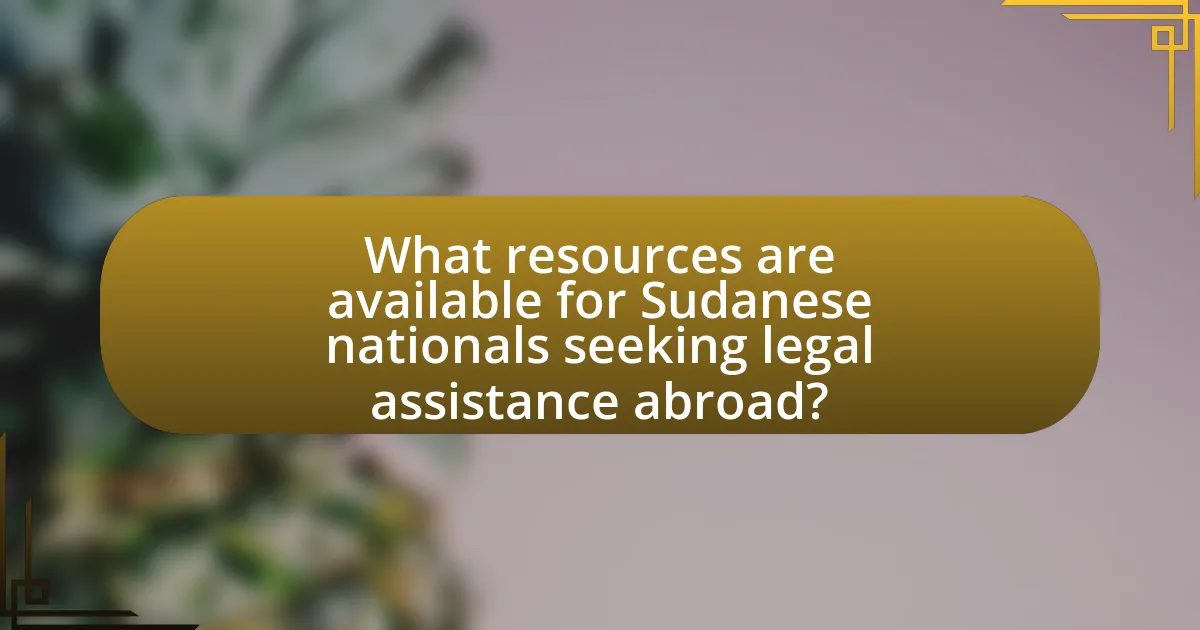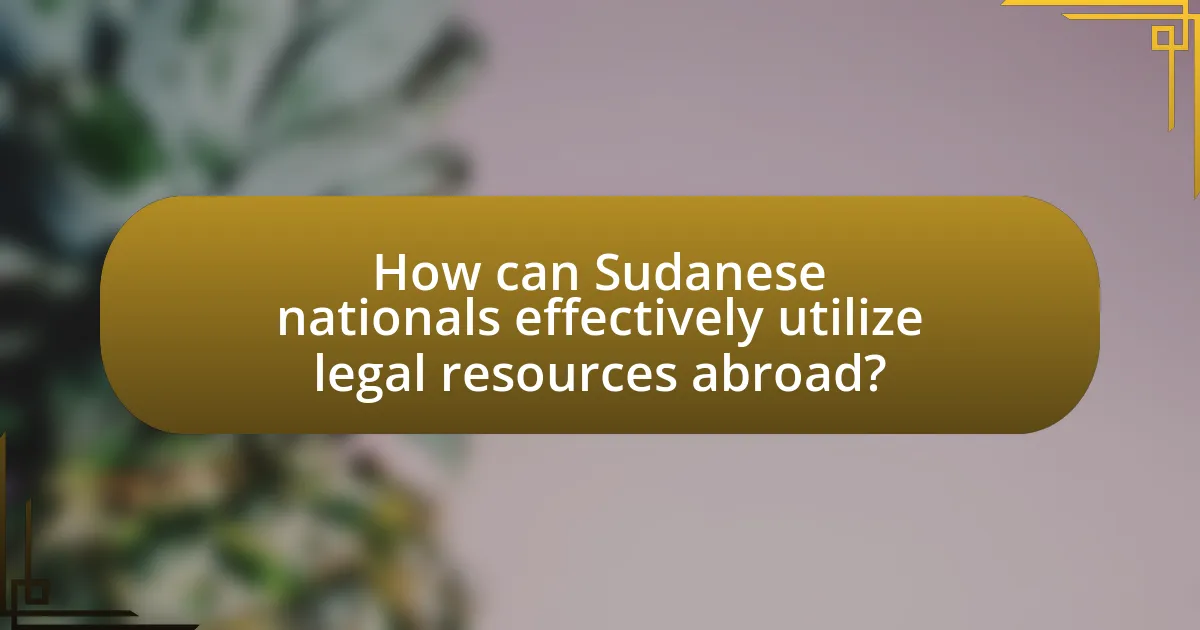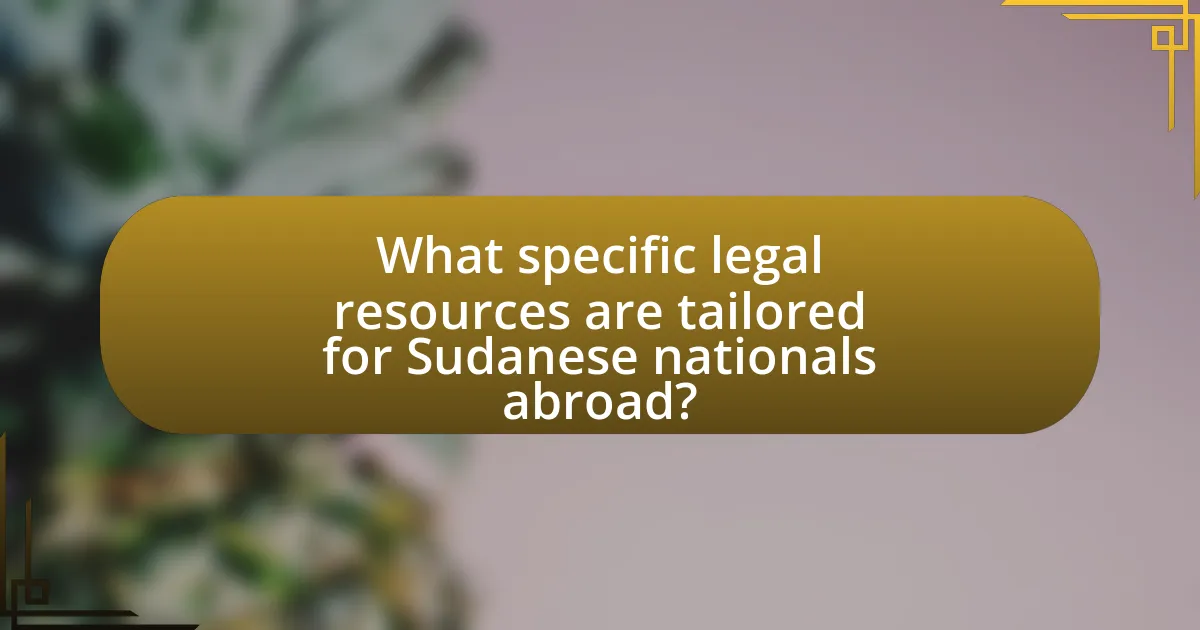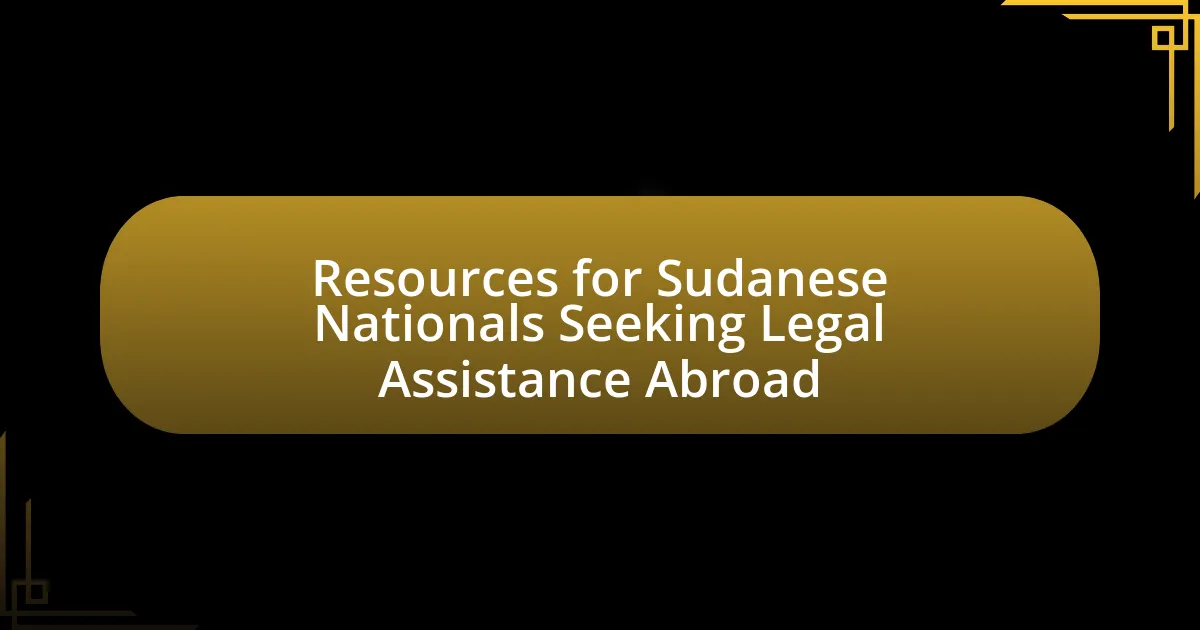Sudanese nationals seeking legal assistance abroad can access a variety of resources, including legal aid organizations, embassies, and online platforms. Key organizations such as the International Refugee Assistance Project and local Sudanese community centers provide tailored support for legal issues, particularly in immigration and asylum cases. Sudanese embassies and consulates play a crucial role in connecting individuals with local legal resources and offering guidance on navigating foreign legal systems. Common challenges faced by Sudanese nationals include language barriers, discrimination, and unfamiliarity with local laws, which can complicate their access to legal representation. Understanding their rights and utilizing available resources effectively is essential for Sudanese nationals to address legal challenges in foreign jurisdictions.

What resources are available for Sudanese nationals seeking legal assistance abroad?
Sudanese nationals seeking legal assistance abroad can access various resources, including legal aid organizations, embassies, and online legal platforms. Legal aid organizations, such as the International Refugee Assistance Project, provide support specifically for refugees and displaced individuals, including Sudanese nationals. Additionally, Sudanese embassies and consulates offer legal guidance and can connect individuals with local legal resources in their host countries. Online platforms like Avvo and Justia provide directories of lawyers who may offer pro bono services or consultations for those in need. These resources collectively aim to assist Sudanese nationals in navigating legal challenges while abroad.
How can Sudanese nationals identify legal assistance resources in foreign countries?
Sudanese nationals can identify legal assistance resources in foreign countries by utilizing embassies, consulates, and legal aid organizations. Embassies and consulates often provide lists of local legal practitioners and resources tailored to assist their citizens. Additionally, Sudanese nationals can access online platforms and directories that specialize in legal services, such as the International Association of Lawyers or local bar associations, which often have multilingual resources. Furthermore, community organizations and Sudanese diaspora groups may offer guidance and referrals to trusted legal professionals familiar with the specific needs of Sudanese nationals.
What types of organizations provide legal assistance to Sudanese nationals abroad?
Various organizations provide legal assistance to Sudanese nationals abroad, including non-governmental organizations (NGOs), international human rights organizations, and legal aid clinics. NGOs such as the Sudanese American Physicians Association and the Sudanese Community Center offer support and resources for legal issues. International human rights organizations like Amnesty International and Human Rights Watch advocate for the rights of Sudanese individuals and may provide legal guidance. Additionally, legal aid clinics in countries with significant Sudanese populations, such as the United States and Canada, offer pro bono legal services to assist with immigration and asylum cases. These organizations play a crucial role in ensuring that Sudanese nationals receive the legal support they need while navigating complex legal systems abroad.
How can Sudanese nationals access government resources for legal aid in other countries?
Sudanese nationals can access government resources for legal aid in other countries by contacting the Sudanese embassy or consulate in the respective country. These diplomatic missions provide information on available legal assistance programs, local legal aid services, and can facilitate communication with local attorneys. Additionally, the Sudanese government may have specific agreements or partnerships with legal aid organizations in various countries, which can be leveraged for support.
What are the common legal issues faced by Sudanese nationals abroad?
Sudanese nationals abroad commonly face legal issues such as immigration challenges, discrimination, and difficulties accessing legal representation. Immigration challenges often include visa overstays, deportation risks, and navigating complex immigration laws in host countries. Discrimination can manifest in various forms, including racial profiling and unequal treatment under the law, which can hinder their ability to seek justice. Additionally, many Sudanese nationals struggle to find legal representation due to language barriers and a lack of awareness about their rights, which complicates their ability to address legal matters effectively. These issues are documented in reports from organizations like the International Organization for Migration, which highlights the vulnerabilities faced by migrants, including those from Sudan.
How do immigration laws affect Sudanese nationals seeking legal assistance?
Immigration laws significantly impact Sudanese nationals seeking legal assistance by determining their eligibility for various forms of aid and protection. For instance, stringent immigration policies may limit access to legal resources, as individuals may fear deportation or legal repercussions when seeking help. Additionally, specific laws, such as those governing asylum or refugee status, directly influence the availability of legal support services tailored to Sudanese nationals. According to the United Nations High Commissioner for Refugees (UNHCR), Sudanese individuals often face unique challenges due to ongoing conflicts and human rights violations in their home country, which can complicate their legal situations abroad.
What rights do Sudanese nationals have when facing legal challenges in foreign jurisdictions?
Sudanese nationals facing legal challenges in foreign jurisdictions have the right to legal representation, the right to a fair trial, and the right to consular assistance. These rights are generally protected under international law and treaties, such as the Vienna Convention on Consular Relations, which allows Sudanese nationals to seek help from their embassy or consulate when detained or facing legal issues abroad. Additionally, they are entitled to be informed of the charges against them and to have access to an interpreter if needed, ensuring that they can adequately defend themselves in legal proceedings.

How can Sudanese nationals effectively utilize legal resources abroad?
Sudanese nationals can effectively utilize legal resources abroad by accessing local legal aid organizations, consulting with embassies, and leveraging online legal platforms. Local legal aid organizations often provide free or low-cost services tailored to the needs of foreign nationals, including Sudanese individuals facing legal issues. Embassies can offer guidance on legal rights and connect individuals with reputable local attorneys. Additionally, online legal platforms provide resources such as legal advice, document templates, and forums for discussing legal matters, which can be particularly beneficial for Sudanese nationals unfamiliar with the legal systems in foreign countries.
What steps should Sudanese nationals take when seeking legal assistance in a foreign country?
Sudanese nationals seeking legal assistance in a foreign country should first identify and contact the nearest Sudanese embassy or consulate for guidance. Embassies provide essential resources, including lists of local attorneys who are familiar with Sudanese law and can offer relevant legal advice. Next, Sudanese nationals should gather all necessary documentation related to their legal issue, as this will facilitate the attorney’s understanding of the case. Additionally, they should inquire about the attorney’s experience with similar cases and discuss fees upfront to avoid misunderstandings. It is also advisable to seek referrals from trusted contacts or organizations that assist expatriates, as these can lead to reputable legal professionals.
How can Sudanese nationals prepare for consultations with legal professionals abroad?
Sudanese nationals can prepare for consultations with legal professionals abroad by gathering all relevant documents and information related to their legal issues. This includes identification documents, any legal paperwork, and a clear outline of their legal questions or concerns. Additionally, they should research the legal professional’s background, including their expertise and experience in the relevant area of law, to ensure they are well-informed before the consultation. Preparing a list of specific questions can also help maximize the effectiveness of the meeting.
What documentation is typically required for legal assistance applications?
Legal assistance applications typically require documentation such as proof of identity, income verification, and details of the legal issue. Proof of identity can include a government-issued ID or passport, while income verification may involve recent pay stubs or tax returns to demonstrate financial need. Additionally, applicants must provide a description of their legal issue, which helps legal aid organizations assess eligibility and determine the appropriate assistance.
What challenges might Sudanese nationals encounter when seeking legal help abroad?
Sudanese nationals may encounter several challenges when seeking legal help abroad, including language barriers, lack of familiarity with foreign legal systems, and potential discrimination. Language barriers can hinder effective communication with legal professionals, making it difficult to convey their needs and understand legal processes. Additionally, Sudanese nationals may not be well-versed in the legal frameworks of the host country, which can complicate their ability to navigate the legal system effectively. Furthermore, instances of discrimination based on nationality or ethnicity may lead to unequal treatment or reluctance from legal practitioners to take on their cases. These challenges can significantly impede Sudanese nationals’ access to adequate legal assistance in foreign jurisdictions.
How can language barriers impact access to legal resources for Sudanese nationals?
Language barriers significantly hinder access to legal resources for Sudanese nationals by preventing effective communication with legal professionals and understanding legal documents. This lack of comprehension can lead to misinterpretations of legal rights and obligations, ultimately affecting the ability to navigate legal systems. For instance, a study by the International Organization for Migration highlights that language difficulties can result in inadequate legal representation and increased vulnerability to exploitation. Furthermore, many legal resources, including websites and documentation, may not be available in Arabic or Sudanese dialects, further isolating individuals from necessary support.
What cultural differences should Sudanese nationals be aware of when seeking legal assistance?
Sudanese nationals should be aware that cultural differences can significantly impact their interactions with legal professionals in foreign countries. For instance, in many Western legal systems, direct communication and assertiveness are valued, while in Sudanese culture, indirect communication and respect for hierarchy may be more prevalent. This difference can lead to misunderstandings; legal professionals may perceive Sudanese clients as passive or unengaged if they do not express their concerns openly. Additionally, Sudanese nationals may need to navigate varying attitudes towards authority and formality, as some cultures prioritize a more casual approach to legal discussions, which may conflict with Sudanese norms of respect and formality. Understanding these cultural nuances can enhance effective communication and foster a more productive relationship with legal assistance abroad.

What specific legal resources are tailored for Sudanese nationals abroad?
Sudanese nationals abroad can access specific legal resources such as the Sudanese embassies and consulates, which provide legal assistance and guidance on local laws. Additionally, organizations like the Sudanese Community Center in various countries offer legal aid and support tailored to the needs of Sudanese expatriates. These resources are crucial for navigating legal issues related to immigration, employment, and family law, ensuring that Sudanese nationals receive appropriate legal representation and advice in their host countries.
What online platforms offer legal assistance specifically for Sudanese nationals?
Online platforms that offer legal assistance specifically for Sudanese nationals include the Sudanese American Medical Association (SAMA), which provides legal resources and referrals, and the Sudanese Community Center, which offers legal aid services tailored to the needs of Sudanese individuals. Additionally, organizations like Refugee Legal Aid Information and the International Refugee Assistance Project (IRAP) provide legal support and guidance for Sudanese refugees and asylum seekers. These platforms are designed to address the unique legal challenges faced by Sudanese nationals, ensuring they receive appropriate assistance.
How can Sudanese nationals find local legal aid clinics in their host countries?
Sudanese nationals can find local legal aid clinics in their host countries by utilizing online resources, contacting local NGOs, and reaching out to embassies or consulates. Online platforms such as the International Refugee Assistance Project and local legal aid directories provide listings of available clinics. Additionally, many non-governmental organizations focus on assisting refugees and migrants, offering legal support and guidance. Embassies or consulates can also provide information on legal resources available in the host country, ensuring Sudanese nationals have access to necessary legal assistance.
What role do Sudanese community organizations play in providing legal support?
Sudanese community organizations play a crucial role in providing legal support by offering resources, advocacy, and assistance tailored to the unique needs of Sudanese nationals. These organizations often facilitate access to legal information, connect individuals with pro bono legal services, and help navigate complex immigration processes. For instance, organizations like the Sudanese American Foundation have been instrumental in providing workshops and legal clinics that educate community members about their rights and available legal options. This support is vital, especially in contexts where Sudanese individuals may face language barriers or unfamiliarity with the legal systems in their host countries.
What are the best practices for Sudanese nationals seeking legal assistance abroad?
Sudanese nationals seeking legal assistance abroad should first research and identify reputable legal aid organizations or law firms that specialize in international law and immigration issues. It is essential to verify the credentials and experience of the legal professionals, ensuring they have a track record of successfully assisting clients from Sudan or similar backgrounds. Additionally, Sudanese nationals should gather all relevant documentation, including identification, legal papers, and any correspondence related to their case, to provide comprehensive information to their legal counsel. Engaging with local Sudanese community organizations can also provide valuable referrals and support. These practices enhance the likelihood of receiving effective legal assistance tailored to their specific needs.
How can Sudanese nationals ensure they are choosing reputable legal resources?
Sudanese nationals can ensure they are choosing reputable legal resources by verifying the credentials and experience of legal professionals, consulting recognized legal directories, and seeking recommendations from trusted sources. Legal professionals should have valid licenses to practice law in their jurisdiction, which can be confirmed through local bar associations or regulatory bodies. Additionally, reputable legal directories, such as Martindale-Hubbell or Avvo, provide ratings and reviews that can help assess the credibility of lawyers. Recommendations from community organizations or individuals who have previously accessed legal services can also guide Sudanese nationals in selecting reliable legal resources.
What tips can help Sudanese nationals navigate the legal system in a foreign country?
Sudanese nationals can effectively navigate the legal system in a foreign country by seeking assistance from local legal aid organizations and understanding their rights under the host country’s laws. Engaging with local legal aid services, which often provide free or low-cost legal advice, can help Sudanese nationals clarify legal processes and requirements specific to their situation. Additionally, familiarizing themselves with the legal framework and cultural norms of the host country can prevent misunderstandings and ensure compliance with local regulations. For instance, many countries have resources available through embassies or consulates that can guide foreign nationals in legal matters, reinforcing the importance of utilizing these resources for accurate information and support.

Leave a Reply